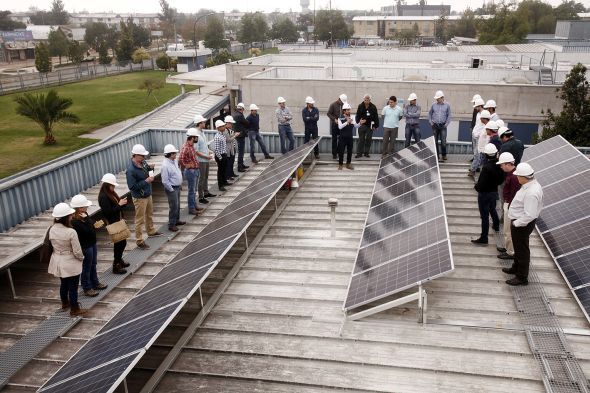Solar boom in Chile poses new challenges

The massive increase in the use of photovoltaics in energy generation is posing new challenges for Chile when integrating renewable energy into local power grids.
More than one hundred experts from all over South America met at an international conference ‘Redes Renovables’ (renewable grids) in Santiago, Chile to discuss the impact of decentralised electricity generation from renewable energies. Photovoltaic (PV) is currently the most cost-effective type of electricity generation in many countries of South America. The combination of high solar radiation and a sharp fall of module prices have led to a ‘solar boom’. Chile is the undisputed forerunner in the region, with almost one gigawatt of PV capacity connected to the grid so far, representing approximately 5% of all power station capacity. This share is expected to increase to approximately 12%, as further plants with a capacity of 1.6 GW are currently under construction.
The project Promotion of Solar Energy in Chile that is funded by the International Climate Initiative (IKI) of the German Environment Ministry (BMUB) is helping to improve the conditions to develop the solar energy market in the country. Solar power has been an enormous success in Chile so far due to the expansion of PV megawatt open-site systems in the north of the country. Similar to Germany, efforts for expanding the transmission grids are progressing swiftly so that the generated electricity can be used throughout the country. At the local level, this has raised a number of questions on the integration of renewable energies into the power grid. More and more private households and small industrial enterprises are installing solar plants to reduce their electricity costs. This changes the conditions for the operation of transmission and distribution grids fundamentally. The regulatory authorities and energy suppliers of all South American countries are actively addressing the new challenges.

The conference in Santiago that was organised by the IKI project in October focused primarily on how to design innovative regulatory policies in this area. In parallel, a four-day training course was offered for the Latin American delegation. It is expected that institutions from other Latin American states will follow the Chilean example.
“The huge interest in the event throughout the entire region shows the potential of renewable energies in Latin America in general and in particular in the decentralisation of electricity generation. The technical, regulatory and socio-economic preconditions have to be taken into account in every country, quite often even at the regional or at the municipal level“, says Rainer Schröer, head of the Energy Programme of the Deutsche Gesellschaft für Internationale Zusammenarbeit (GIZ) GmbH in Chile.
The event was carried out as part of the BMUB-financed Energy Programme by the Chilean Ministry of Energy and GIZ in cooperation with the International Energy Agency (IEA).
The link has been copied to the clipboard
Contact
IKI Office
Zukunft – Umwelt – Gesellschaft (ZUG) gGmbH
Stresemannstraße 69-71
10963 Berlin













